Excavation Contractors Horseshoe Bay
Top Excavation Contractor in Horseshoe Bay
Receive multiple Excavation Companies quotes for your project today! Compare profiles, reviews, accreditations, portfolio, etc... and choose the best service.
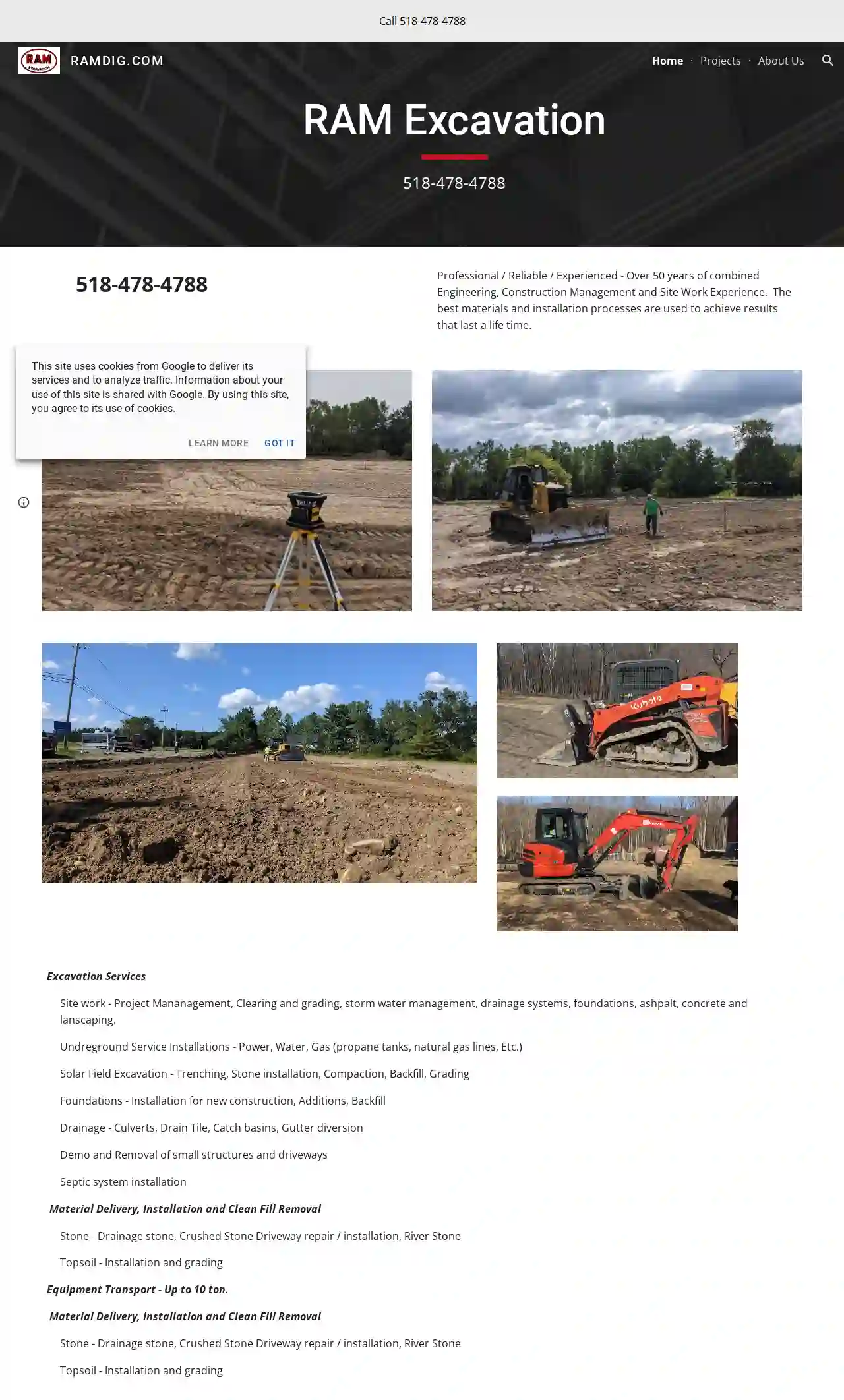
Ram Excavation
51 reviewsAllen, USThis is RAM In early 2020 Rick and Mike became RAM. A unique partnership that brings together exceptional project management and true construction grit. This team will deliver for you on your next project, be it a small land clearing job or large site work project. Rick Premo Rick Premo - MBA / MS Mfg Engineering. 28 years of professional experience in management, leadership, engineering and construction. Specializing in project management, ensuring construction projects are completed on time and on budget. Rick received a BS in Manufacturing Engineering 1992 from Boston University and quickly developed a passion for manufacturing and construction management. Rick has a diversified background and has held many positions in the corporate world including Program Management, Plant Manager, Materials Manager, Quality Manager, Senior Product Engineer and Computer Consultant. His expertise is in managing multi-million dollar projects, delivering results to customers and stakeholders. Rick has also had a very diverse career in the private sector. Owning several businesses focusing on construction projects, land development and real estate. Mike Fennel Mike Fennel - Master Electrician. Over 20 Years of construction experience specializing in managing union site work for the Local 236 Electrician's Union. Mike has spent many years "grinding it out" at Global Founderies, building the infrastructure to support the high tech chip manufacturer. Before becoming a partner Ram Excavation, Mike led teams of men on the job site as a General Forman. Each day ensuring that the manpower, materials and coordination so the projects go smoothly. He has been in commercial construction management for 20 years. He has worked multiple building projects from the ground up. Since Mike has ventured into the private space he has maintained his relationship with the Union and in the future plans to provide support to his brothers on the job site. On a personal level Mike is "got your back" kind of guy. Extremely hard working, dependable and reliable. There is no quit in this man...
- Services
- Why Us?
- Our Team
- Gallery
Get Quote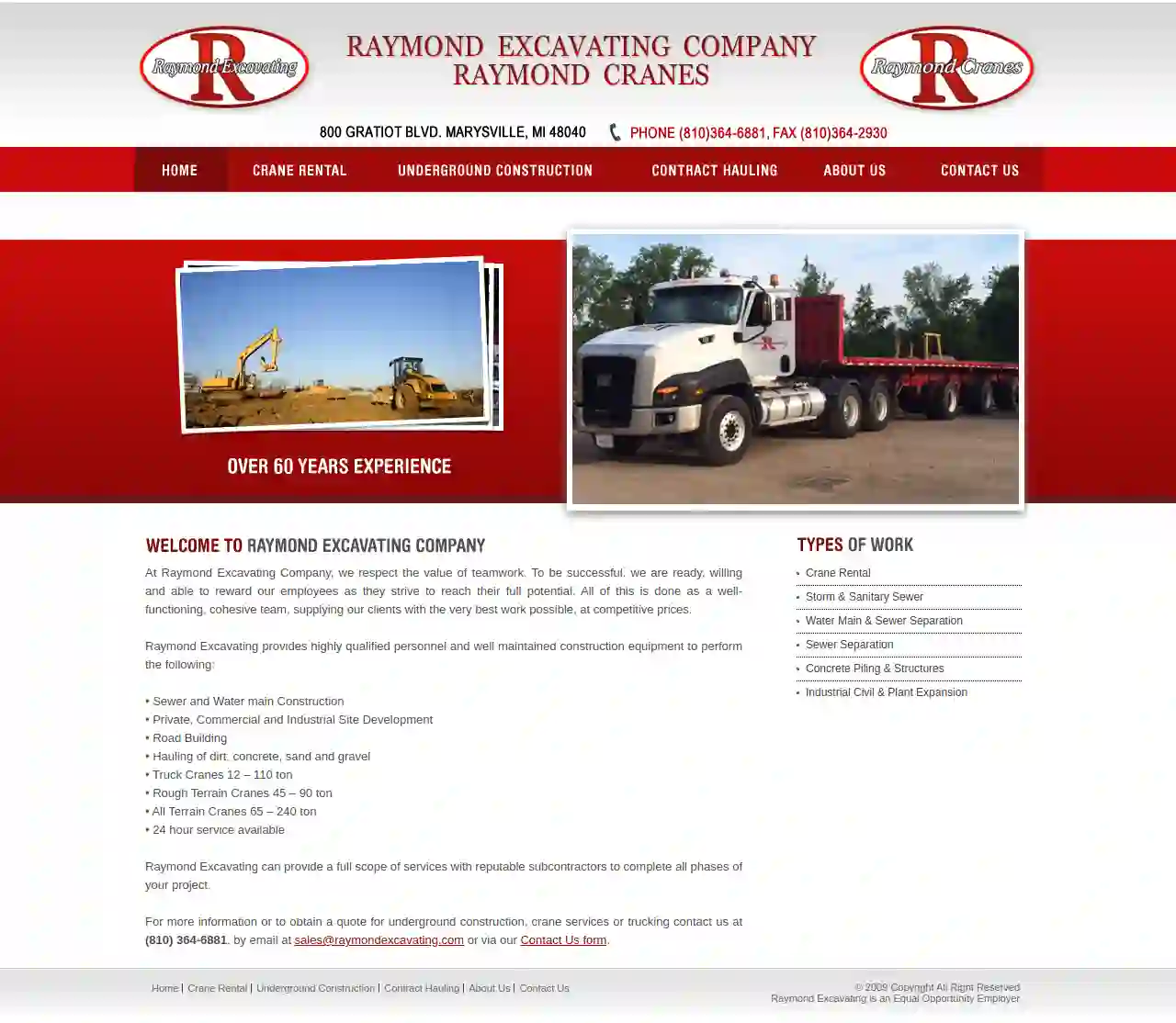
Raymond Excavating Co
56 reviews800 Gratiot Blvd., Marysville, 48040, USRaymond Excavating: Your Trusted Partner for Excavation and Construction Raymond Excavating Company is a privately owned corporation led by Dave Burgess, President, and Brandon Burgess, Vice President. Founded in 1954 by Raymond Burgess, we have been serving St. Clair County and surrounding areas with exceptional earthwork and underground utility services. Our commitment to teamwork, combined with highly qualified personnel and well-maintained equipment, ensures we deliver the highest quality work at competitive prices. We take pride in our long-standing reputation as a Michigan Department of Transportation prequalified contractor for over 35 years. Our experience spans a wide range of projects, including collaborations with the State of Michigan, St. Clair County, Macomb Township, City of Port Huron, City of Marysville, Marysville Ethanol LLC, DCP Midstream, Dupont, and various other municipalities. We have also partnered with the U.S. Corps of Engineers, private developers, and major industrial firms. Raymond Excavating is equipped to handle your project's needs with a diverse fleet of track excavators, dozers, rubber tired loaders, tractor backhoes, lifting cranes, and tractor/trailers. Our team is comprised of skilled and experienced professionals who are members of the Operating Engineers and Laborers Unions, ensuring a high level of expertise and dedication to safety. We are committed to providing a full scope of services, including reputable subcontractors, to complete all phases of your project. Whether you require underground construction, crane services, or trucking, we are here to meet your needs. Contact us today for a quote or to discuss your project requirements.
- Services
- Why Us?
- Our Team
- Gallery
Get Quote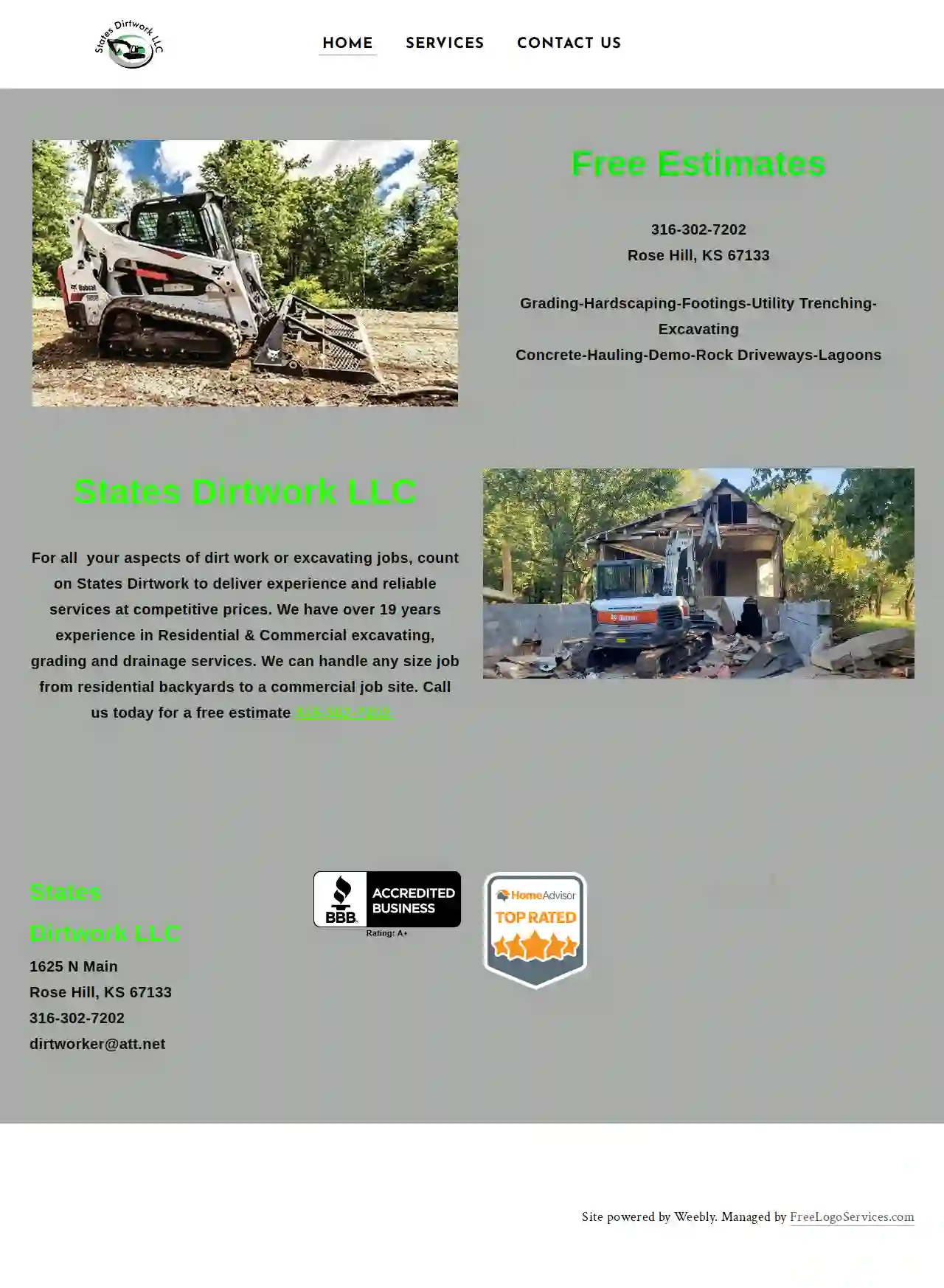
States Dirtwork
4.910 reviews1625 N Main, Rose Hill, 67133, USStates Dirtwork LLC For all your aspects of dirt work or excavating jobs, count on States Dirtwork to deliver experience and reliable services at competitive prices. We have over 19 years experience in Residential & Commercial excavating, grading and drainage services. We can handle any size job from residential backyards to a commercial job site. Call us today for a free estimate.
- Services
- Why Us?
- Gallery
Get Quote
Septic Pro Pumping
5116 reviewsCorpus Christi TX, Corpus Christi, 78410, USOrange Grove SEPTIC TANKS If you are renovating or building a new home and require repair or maintenance for your septic tank, Septic Pro Pumping offers qualified services for all types of residential or commercial septic systems in the Orange Grove region. When municipal water services are not available in Orange Grove, our licensed team of workers provides qualified expertise and the most updated equipment to ensure that your Orange Grove property has access to clean water and a well-functioning drainage system. If sewage services are not available in your region of Orange Grove, contact Septic Pro Pumping for installation that offers safety and peace of mind. From the first soil sample taken from your property, to the complete installation of your system, our experienced team of specialists provides efficient septic tank services for homeowners and commercial industries that include repair and replacement of any required component. Fully licensed and insured, Septic Pro Pumping handles all necessary permits and building code requirements for the installation of a septic tank system in Orange Grove. Our services include: Septic Cleaning Septic tank cleaning and pumping Septic tank system inspection and repair System maintenance programs Septic tank excavation services Free estimates Residential and Commercial septic systems Essential system maintenance Septic tanks separate and partially decompose solids from the wastewater that allows liquid to flow to the drain field. To ensure that your water remains uncontaminated the septic tank on your property in Orange Grove must be inspected regularly. If you suspect any malfunction, or detect a foul odor coming from your septic tank, contact Septic Pro Pumping immediately at (361) 438-8423 for an emergency inspection without delay. See What Our Clients Say Minerva Keever I was very impressed with the attention to detail. Mark educated me on the problems with my septic system. Went beyond my expectation. I was very pleased with the work done by Mark and will most definitely recommend him to my family and friends. Diana Guerra I definitely recommend Septic Pro Pumping. They were very professional and efficient. They were able to fix my septic system quickly and at a reasonable price.
- Services
- Why Us?
- Testimonials
- Gallery
Get Quote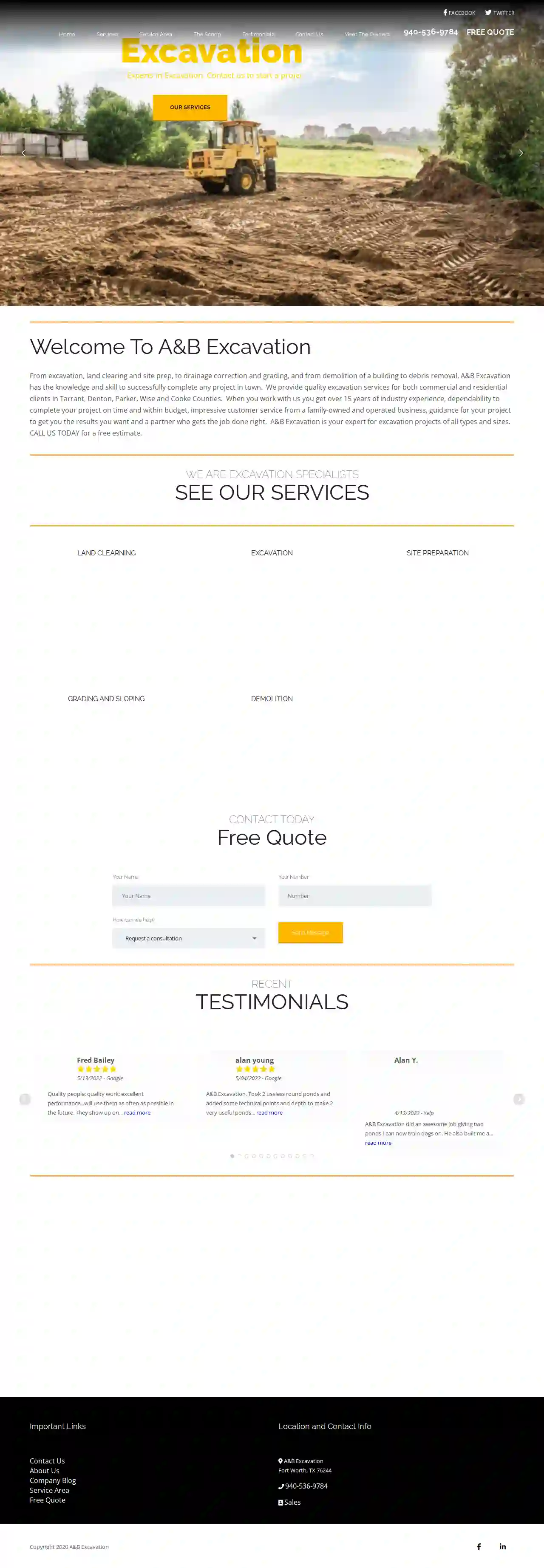
A&B Excavation
4.914 reviewsFort Worth, USWelcome to A&B Excavation From excavation, land clearing and site prep, to drainage correction and grading, and from demolition of a building to debris removal, A&B Excavation has the knowledge and skill to successfully complete any project in town. We provide quality excavation services for both commercial and residential clients in Tarrant, Denton, Parker, Wise and Cooke Counties. When you work with us you get over 15 years of industry experience, dependability to complete your project on time and within budget, impressive customer service from a family-owned and operated business, guidance for your project to get you the results you want and a partner who gets the job done right. A&B Excavation is your expert for excavation projects of all types and sizes. CALL US TODAY for a free estimate. We Are Excavation Specialists A&B Excavation is a family-owned and operated business with over 15 years of experience in the excavation industry. We are committed to providing our clients with the highest quality excavation services at competitive prices. We are also dedicated to providing our clients with excellent customer service and a commitment to safety. We are fully licensed and insured, and we are proud to serve the communities of Tarrant, Denton, Parker, Wise and Cooke Counties.
- Services
- Why Us?
- Testimonials
- Gallery
Get Quote
Roto-Rooter Plumbing & Water Cleanup
4.9Overland Park, USOverland Park Plumbers Near You Overland Park Plumbing & Drain Solutions: Licensed Overland Park Plumber Providing 24/7 Emergency Plumbing and Drain Services For reliable residential and commercial drain cleaning and plumbing services, call Roto-Rooter plumbers in Overland Park today. We proudly provide a full selection of plumbing maintenance and repair services including sump pumps, water heater repair, and drain cleaning. Our plumbers are available according to your schedule, at a time that is most convenient for you - so a plumbing problem doesn't have to derail your week. We also specialize in emergency plumbing services, available 24 hours a day, 7 days a week. Best of all, our emergency plumbing services never cost extra, even on weekends, evenings or holidays. Roto-Rooter has been a trusted and recommended full service plumbing company since 1935. Learn what has made us the premier plumbing provider in Overland Park and surrounding areas. Call today to schedule an appointment with our
- Services
- Why Us?
- Testimonials
- Gallery
Get Quote
Ten Point Turf and Excavation LLC
57 reviewsPlano, USWelcome to Ten Point Turf & Excavation LLC, where we sculpt dreams into reality and ground into artistry. Over 15 years of experience with land leveling and other services. Our artificial turf installation and excavation service is more than just dirt and grass; it's the foundation of your vision. From precision excavation to lush, green landscapes, we dig deep to bring your projects to life! At Ten Point Turf & Excavation LLC, our mission is to provide high-quality artificial turf installation and excavation services to our customers, offering innovative solutions that enhance outdoor spaces and exceed expectations. With a commitment to professionalism, reliability, and customer satisfaction, we aim to transform landscapes with eco-friendly and sustainable practices, delivering long-lasting and aesthetically pleasing results.
- Services
- Why Us?
- Gallery
Get Quote
Roto-Rooter Plumbing & Water Cleanup
4.8612 reviewsPlano, USPlano's Trusted Plumbing, Drain & Water Cleanup Company Looking for residential or commercial plumbing, drain, and water cleanup services in Plano, Texas? Roto-Rooter has been trusted and recommended as a premier plumbing company since 1935, serving customers in Plano and the greater Dallas-Fort Worth Metroplex. Our highly skilled plumbers in Plano, TX, provide full-service maintenance, repair, replacement, and installation of water filtration systems, toilets, garbage disposals, sewer pipes, water heaters, hose bibs, gas lines, and more, working to meet the endless needs of the area’s customers. We know that you need a fully insured, fully licensed service that can efficiently resolve all your plumbing, drainage, or water cleanup needs at any time of the day or night. That’s why Roto-Rooter offers: Same day service 24/7 availability Fully licensed, insured, experienced plumbers State-of-the-art diagnostics and equipment Senior and military discounts Special financing options available Need an appointment? Call our Plano, TX, plumbing office at 972-890-0695, or use our online scheduling tool.
- Services
- Why Us?
- Testimonials
- Gallery
Get Quote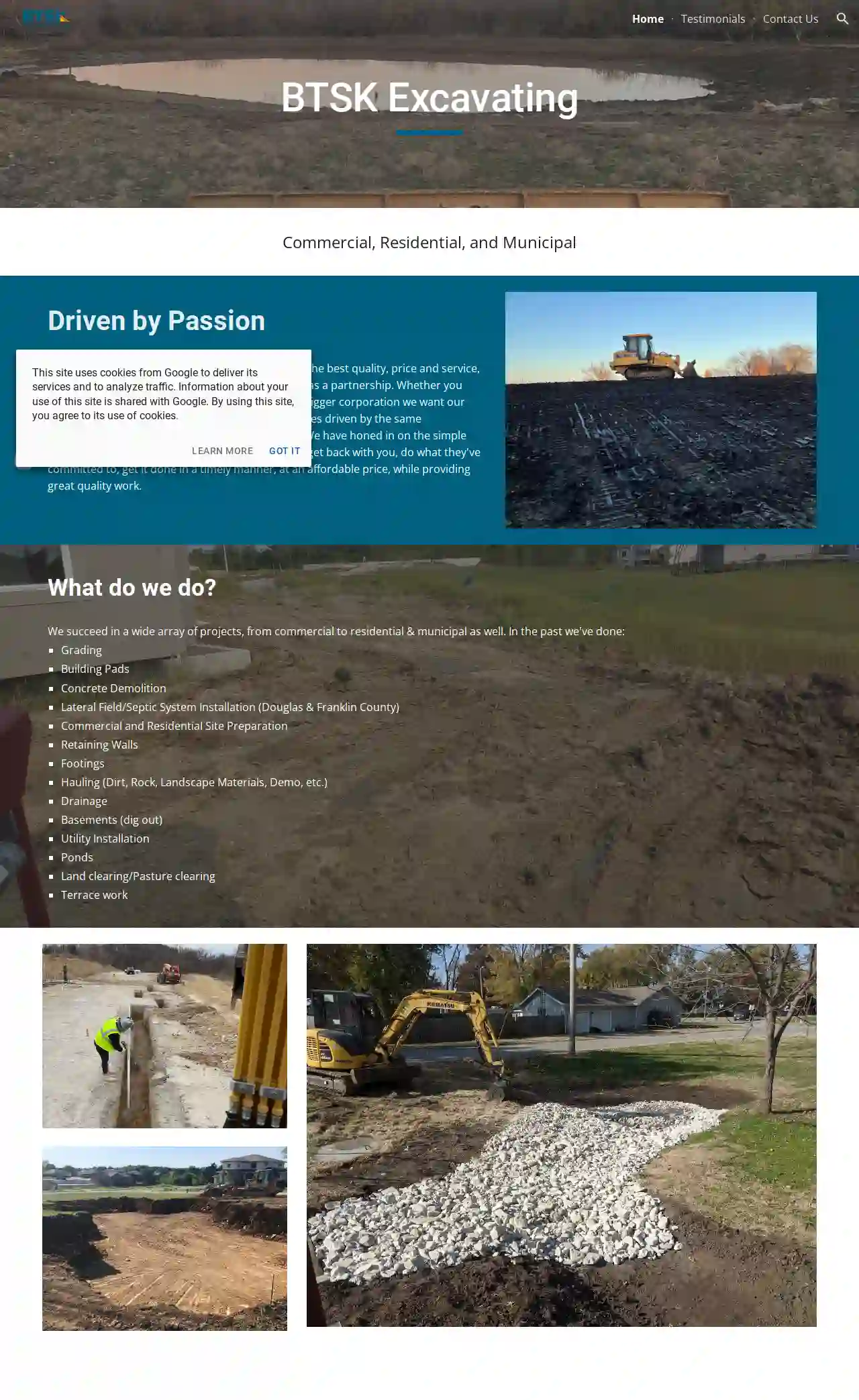
BTSK EXCAVATING, LLC
4.86 reviewsPO Box 762, Baldwin City, 66006, USDriven by Passion We started this company with a passion to provide the best quality, price and service, which our customers deserve. We see each project as a partnership. Whether you are a homeowner, fellow small business owner, or bigger corporation we want our customers to see that passion and see our employees driven by the same commitment to excellence we promise to provide. We have honed in on the simple things that customers desire: a contractor that will get back with you, do what they've committed to, get it done in a timely manner, at an affordable price, while providing great quality work. What do we do? We succeed in a wide array of projects, from commercial to residential & municipal as well. In the past we've done: Grading Building Pads Concrete Demolition Lateral Field/Septic System Installation (Douglas & Franklin County) Commercial and Residential Site Preparation Retaining Walls Footings Hauling (Dirt, Rock, Landscape Materials, Demo, etc.) Drainage Basements (dig out) Utility Installation Ponds Land clearing/Pasture clearing Terrace work
- Services
- Why Us?
- Testimonials
- Gallery
Get Quote
KRS BACKHOE SERVICE LLC || KRS EXCAVATION
52 reviews10134 HAMMERLY SUITE 170, HOUSTON, USWelcome to KRS BACKHOE SERVICE LLC Where our goal is to deliver more than the expected! KRS Backhoe Service LLC was established in Houston, Texas for your one stop to all your underground project needs in mind! Founded in 2006 with over 20 years of experience, our certified operators are here to ensure your next project is successful and less stressful. We specialize in excavation for Electricians and Plumbers in: New Construction Residential Commercial Underground Utilities Electrical PVC Installation For your convenience our company offers multiple equipment and services customized to fit your project's need. Equipment and Operator Operator Only Machine Only Rental Hand digging crews 24/7 Emergency Crews for Repair Call us today to get a free estimate and Prices on our services WE PROVIDE EXPERIENCED HAND DIGGING CREWS FOR RESIDENTIAL REROUTING, TRENCHES AND TUNNELING FOR PLUMBER'S REPAIR We are fully bonded and insured
- Services
- Why Us?
- Gallery
Get Quote
Over 22,076+ Excavation Pros on our platform
Our excavation companies operate in Horseshoe Bay and surroundings!
ExcavationHQ has curated and vetted the Best Excavation Businesses arround Horseshoe Bay. Find the most trustworthy pro today.
Frequently Asked Questions About Excavation Contractors
- Basement Size: The larger the basement, the more excavation is required, increasing the cost.
- Soil Type: Excavating rocky or dense clay soil is generally more expensive than loose soil.
- Accessibility: Difficult-to-access sites might require specialized equipment or more labor, driving up costs.
- Foundation Type: The chosen foundation type (full basement, crawl space, slab) affects excavation needs.
- Underpinning: If underpinning (strengthening existing foundations) is necessary, it significantly increases costs.
- Disposal Fees: Hauling excavated soil to disposal sites adds to the overall expense.
- Determining Soil Suitability: Assessing whether the soil can support the intended structure or load.
- Recommending Foundation Types: Advising on the appropriate foundation design based on soil characteristics.
- Addressing Drainage and Erosion Issues: Providing solutions to manage water runoff and prevent erosion.
- Evaluating Slope Stability: Assessing the risk of landslides or soil movement on slopes.
- Building on challenging soil types (expansive clay, loose sand, etc.)
- Constructing large or complex structures
- Excavating near slopes or retaining walls
- Addressing drainage or erosion concerns
- Excavations Deeper Than a Certain Depth: This varies by jurisdiction, usually around 5 feet.
- Excavations Near Utilities: Digging near buried utilities (gas, water, electric) often requires permits and utility locates to prevent damage.
- Excavations Affecting Public Property: Projects impacting sidewalks, roads, or other public areas typically require permits.
- Excavations in Environmentally Sensitive Areas: Projects in wetlands, floodplains, or other sensitive areas might need special permits.
How much does it cost to excavate a basement?
What is a soil engineer, and do I need one?
What is the difference between excavation and grading?
Excavation: Primarily involves removing earth or other materials from a site. It's about digging down and creating space.
Grading: Focuses on shaping and leveling the ground to a specific slope or elevation. It's about adjusting the existing terrain.
For example, you might excavate a foundation and then grade the surrounding area to ensure proper drainage and a level surface for landscaping.
Do I need a permit for excavation?
How much does it cost to excavate a basement?
- Basement Size: The larger the basement, the more excavation is required, increasing the cost.
- Soil Type: Excavating rocky or dense clay soil is generally more expensive than loose soil.
- Accessibility: Difficult-to-access sites might require specialized equipment or more labor, driving up costs.
- Foundation Type: The chosen foundation type (full basement, crawl space, slab) affects excavation needs.
- Underpinning: If underpinning (strengthening existing foundations) is necessary, it significantly increases costs.
- Disposal Fees: Hauling excavated soil to disposal sites adds to the overall expense.
What is a soil engineer, and do I need one?
- Determining Soil Suitability: Assessing whether the soil can support the intended structure or load.
- Recommending Foundation Types: Advising on the appropriate foundation design based on soil characteristics.
- Addressing Drainage and Erosion Issues: Providing solutions to manage water runoff and prevent erosion.
- Evaluating Slope Stability: Assessing the risk of landslides or soil movement on slopes.
- Building on challenging soil types (expansive clay, loose sand, etc.)
- Constructing large or complex structures
- Excavating near slopes or retaining walls
- Addressing drainage or erosion concerns
What is the difference between excavation and grading?
Excavation: Primarily involves removing earth or other materials from a site. It's about digging down and creating space.
Grading: Focuses on shaping and leveling the ground to a specific slope or elevation. It's about adjusting the existing terrain.
For example, you might excavate a foundation and then grade the surrounding area to ensure proper drainage and a level surface for landscaping.
Do I need a permit for excavation?
- Excavations Deeper Than a Certain Depth: This varies by jurisdiction, usually around 5 feet.
- Excavations Near Utilities: Digging near buried utilities (gas, water, electric) often requires permits and utility locates to prevent damage.
- Excavations Affecting Public Property: Projects impacting sidewalks, roads, or other public areas typically require permits.
- Excavations in Environmentally Sensitive Areas: Projects in wetlands, floodplains, or other sensitive areas might need special permits.